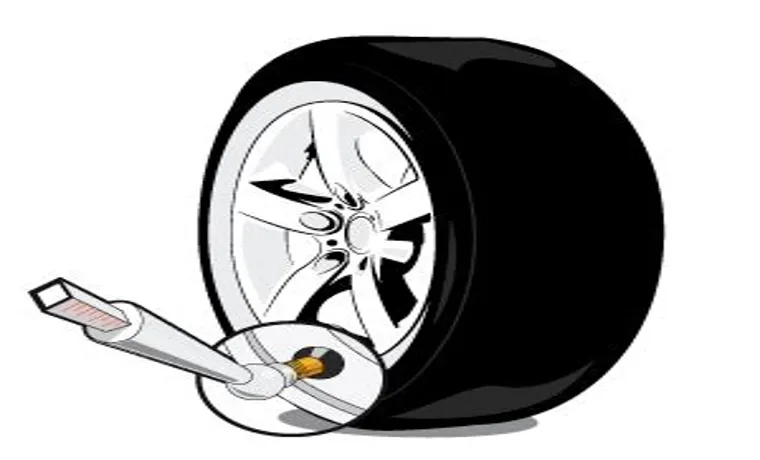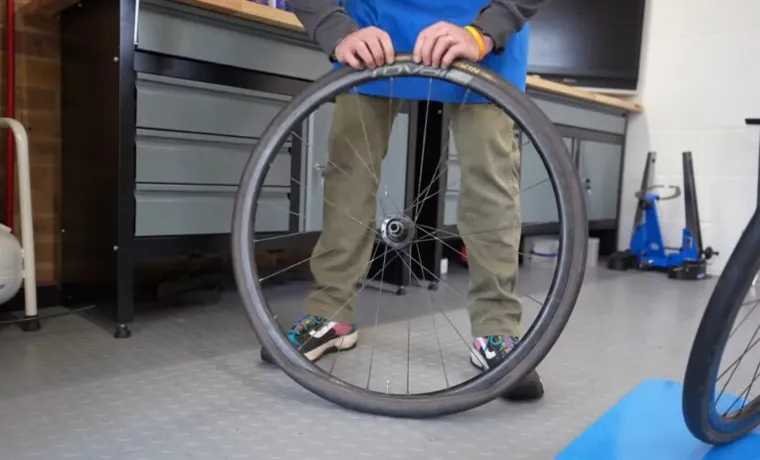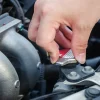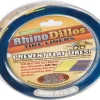Have you ever experienced the frustration of constantly dealing with a popping tire? It can be a real headache, especially if you don’t know why it keeps happening. There are a number of reasons why your tire may be popping, and some may surprise you. Imagine your tire is a balloon.
You blow it up to the desired size, tie it off, and leave it be. However, days later, you notice it’s shriveled up and flat. You inflate it again, only for it to deflate once more.
This can leave you feeling puzzled as to why it keeps happening. That’s how many people feel about their tires. If you’ve been doing everything right like keeping your tires properly inflated and avoiding obstacles, then there must be another underlying issue that’s causing the bursts.
There are several factors to consider when trying to troubleshoot your tire problems, from the material of your tires to the roads you drive on, and even the climate you live in. There could be a simple solution or it could be something that requires expert assistance. Don’t despair.
With the right information and proper care, you can prevent tire blowouts and enjoy a smooth ride. In this blog, we’ll cover some of the most common reasons for tire popping and what you can do to avoid them. So sit tight, buckle up and let’s dive in!
Table of Contents
Possible Causes
If you keep experiencing the frustration of a popping tire, you’re probably wondering why this keeps happening. There are a few possible causes to consider. One reason your tire keeps popping could be due to a lack of maintenance.
When tires are underinflated, it places excess pressure on certain areas of the tire, causing them to wear down more quickly and increasing the likelihood of a blowout. Another possible cause could be a damaged tire, such as a puncture or tear that weakens the structure. Hot weather can also increase the risk of tire blowouts since the heat causes the air inside the tire to expand, leading to increased pressure.
In some cases, the weight distribution of your vehicle may also be a factor. It’s essential to diagnose the problem and address it as soon as possible to avoid further issues.
Underinflation
Underinflation can occur for a variety of reasons, but the most common culprit is simply neglecting to check your tire pressure regularly. Other causes include slow leaks from punctures, damage to the valve stem, or even a faulty pressure gauge. Underinflation can lead to a host of problems, from poor fuel efficiency to increased tire wear, and even more serious safety hazards such as reduced handling and increased risk of blowouts.
It’s important to address underinflation as soon as possible by either adding air to your tires or having them professionally inspected. A good rule of thumb is to check your tire pressure at least once a month and before any long trips. Remember, proper tire inflation not only saves you money in the long run, but it also keeps you safe on the road.

Overinflation
Overinflation can be caused by a number of factors. One possible cause is an excess of demand in the economy which raises prices, leading to inflation. Another possible cause is when the government prints too much money and creates an oversupply of cash in the economy.
In this scenario, too much money chasing too few goods leads to inflation. It is also possible for overinflation to be caused by an international crisis, such as a oil or food shortage that leads to higher prices. Companies may also overinflate prices to take advantage of high demand or to maximize profits, which can lead to inflation in the market.
Overall, overinflation can have negative consequences on the economy, such as a decrease in purchasing power and a rise in interest rates. It is important for policymakers to monitor inflation rates closely and take appropriate action to prevent overinflation from occurring.
Poor Wheel Alignment
Poor wheel alignment can be caused by a number of factors including wear and tear, accidents, and improper installation. Wear and tear from daily use can cause tires to become misaligned over time, while accidents or hitting potholes can cause sudden misalignment. If a vehicle’s suspension system is not installed correctly, uneven tire wear can occur, leading to poor wheel alignment.
Additionally, incorrect tire pressure can cause uneven tire wear and eventually result in poor wheel alignment. It is important to regularly check tire pressure and alignment to ensure the longevity and safety of your vehicle’s tires. Proper maintenance and inspection can prevent these issues and keep your vehicle driving smoothly.
Damaged Rims or Wheels
One of the most common problems car owners encounter with their vehicles is damaged rims or wheels. This issue can be caused by various factors, and understanding the possible causes can help drivers prevent it from happening. One possible cause of damaged rims or wheels is hitting curbs or potholes on the road.
When a car hits a pothole, for instance, the impact can cause the metal rims to bend or crack. Another factor that can cause damage to rims is overloading your vehicle with excess weight. This puts excessive pressure on the rims and may cause them to crack or deform.
In some cases, driving on rough roads or uneven surfaces can also cause damage to your rims or wheels. It is important to address any issues with your rims or wheels as soon as possible to avoid further damage and potential accidents on the road. If you notice any vibrations, shaking, or unusual noises while driving, it’s best to take your car to a professional mechanic for a check-up.
Regular maintenance and care can also help prevent damage to your rims and wheels, ensuring that your vehicle runs smoothly for years to come.
Prevention Tips
Why does my tire keep popping? It’s a frustrating problem that can leave you feeling helpless and stranded on the side of the road. But there are some simple steps you can take to prevent it from happening again. First, make sure your tires are properly inflated and balanced.
This will reduce the wear and tear on your tires and help them last longer. Second, be mindful of the road conditions you’re driving on. Avoid potholes, sharp objects, and rough terrain that can puncture your tires.
Finally, regularly inspect your tires for any signs of damage or wear. If you notice any issues, have them fixed right away to prevent a blowout. By following these tips, you can keep your tires in top condition and avoid the frustration of a popped tire on the road.
Regular Inspection
Regular inspection is crucial in preventing potential damages to your property. By conducting regular inspections, you can identify underlying problems and fix them before they become major issues. Some of the areas you need to inspect include the roof, walls, foundation, and plumbing system.
Inspecting the roof at least twice a year can help you identify missing or damaged shingles, leaks, or cracks. Similarly, check the walls for any signs of water damage, cracks, or peeling paint, which could be due to structural problems or pests. Paying attention to the basement and foundation can prevent the buildup of moisture, which can cause mold growth, rotting, or decay.
Regular plumbing inspections can save you from water damage, high water bills, and plumbing emergencies. By spotting minor leaks, corroded pipes, or low water pressure, you can avoid costly repairs in the future. Overall, maintaining a regular inspection schedule can save you money, protect your property, and ensure its longevity.
Proper Tire Inflation
Proper Tire Inflation When it comes to keeping your car in good condition, one of the most important things you can do is make sure your tires are properly inflated. Not only can this help prevent accidents, but it can also save you money on gas. So, what exactly is proper tire inflation? Simply put, it’s when your tires are filled with the right amount of air.
This amount varies depending on the make and model of your car and the tires you’re using. If you’re not sure what the right tire pressure is for your car, check your owner’s manual or ask your mechanic. Whatever you do, don’t rely solely on the tire pressure monitoring system in your car.
These systems are often not very accurate, and can even malfunction. Prevention Tips So, now that you know why proper tire inflation is important, how can you make sure your tires are always inflated correctly? Here are a few tips: Check your tire pressure at least once a month, and before any long trips.
Use a high-quality tire pressure gauge to measure your tire pressure.
Make sure you’re checking your tire pressure when the tires are cold or haven’t been driven on for at least 3 hours. Don’t over-inflate your tires.
This can cause them to wear out faster and can also make your car handle poorly. Don’t under-inflate your tires.
Avoiding Overloading the Vehicle
Overloading your vehicle can result in serious consequences and safety hazards. To prevent this from happening, there are several prevention tips that you should follow. Firstly, make sure that you know the weight limit of your vehicle and do not exceed it.
This can usually be found in the owner’s manual or on the driver’s side door frame. Secondly, evenly distribute the weight of your load in the vehicle, rather than placing it all in one area. This helps to maintain balance and stability on the road.
Additionally, avoid placing heavy items on the roof rack as it can affect the vehicle’s center of gravity and cause instability. Lastly, be mindful of the number of occupants in the vehicle. Too many passengers can increase the weight and cause strain on the suspension, which can lead to accidents.
By following these simple prevention tips, you can avoid overloading your vehicle and ensure a safe and comfortable ride for all.
Maintaining Good Road Conditions
Maintaining good road conditions is crucial to ensuring the safety of drivers, passengers, and pedestrians alike. One of the most effective ways to prevent damage to the road is by regularly inspecting it for any signs of wear and tear. This can include checking for cracks, potholes, and other signs of damage caused by heavy vehicles, exposure to extreme weather conditions, or age.
In addition to inspecting the road, it’s also important to keep it clean and clear of any debris or litter that can cause accidents or impede traffic flow. Remember, prevention is key when it comes to maintaining good road conditions and keeping everyone safe on the road. By taking proactive measures such as regular inspections and keeping the road clean, we can help preserve the longevity of our roads and ensure a smooth and safe journey for all.
When to See a Professional
If you find yourself constantly changing out your tire due to it popping, it is time to see a professional. Continued popping can indicate a larger issue at play, such as a damaged wheel or poor alignment. Additionally, attempting to fix the issue yourself may cause more harm than good in the long run.
Consulting a professional not only ensures that the issue is resolved properly, but also helps to prevent future incidents. Don’t let a popping tire continue to be a hassle in your life. Visit a professional to get back on the road safely and efficiently.
Conclusion
Well, it looks like your tire has a vendetta against you. Either that, or you need to take a closer look at where and how you are driving. Factors like low tire pressure, rough road conditions, and reckless driving can all contribute to tire pops.
So next time you hit the road, remember to keep a close eye on your tires and drive responsibly. And if all else fails, maybe it’s time to invest in a unicycle.”
FAQs
Why does my tire keep popping?
There could be several reasons for your tire to keep popping. It could be due to low tire pressure, overloading the vehicle, or driving on roads with potholes or sharp objects. It’s important to get the root cause identified by a professional and get it fixed.
Can an old tire cause it to keep popping?
Yes, old tires are prone to punctures and blows. If you have been using an old tire, it’s a good idea to get it replaced to avoid any further issues.
Is there a way to prevent tire punctures?
While punctures can’t be completely avoided, you can take precautions like checking tire pressure regularly, avoiding overloading the vehicle, and being mindful of the road conditions and avoiding sharp objects.
Will tire punctures affect my vehicle’s performance?
Yes, tire punctures can affect the performance of your vehicle, especially if you continue driving on a flat tire. It can damage the wheel and suspension leading to expensive repairs.
Can I repair a punctured tire myself?
It’s not recommended to try and repair a punctured tire yourself, as it requires expertise and specialized equipment. It’s better to take your vehicle to a professional to ensure the puncture is repaired properly.
Are run-flat tires a good option to avoid punctures?
Run-flat tires are designed to be driven even after they lose air pressure, but they are not completely puncture-proof. They can still get punctured, but they can provide extra support in case of a flat.
How long can you drive with a punctured tire?
It’s recommended not to drive more than a few miles with a punctured tire, as it can cause irreparable damage to the tire and make it more difficult to repair. It’s better to call for roadside assistance or change the tire yourself if possible.



